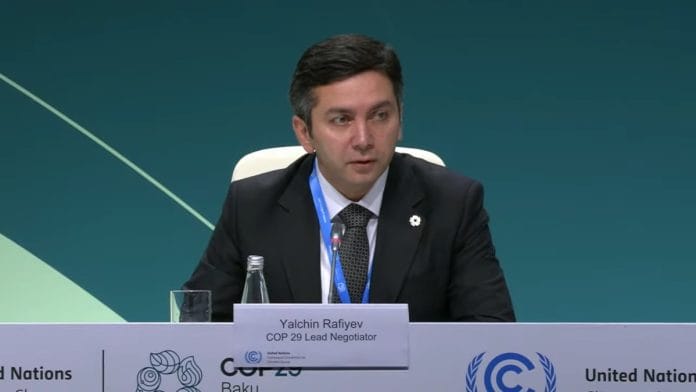New Delhi: World leaders patted themselves on the back after the first day of global climate talks at COP29 in Baku, Azerbaijan as the long-awaited yet controversial Article 6.4 of the Paris Agreement, that defines a UN-led global carbon market, was finally adopted by countries, signalling a “major breakthrough”.
This is a mechanism that allows countries to trade carbon credits to help reduce greenhouse gas emissions and combat climate change.
In a press conference Tuesday, Azerbaijan’s Yalchin Rafiyev, the lead negotiator of COP29, said a global carbon market would be a “game-changing tool”, and would save the world about $250 billion annually in implementing their climate plans.
“After years of stalemate, we have secured critical progress on one of our chief priorities which is the UN carbon market. Climate breakthroughs in Baku have begun,” said Rafiyev, referring to the adoption of this COP29 agenda on the first day itself.
The press conference also focused on another top agenda—the expectations of a new climate finance goal from developed countries to poorer nations so that they can meet their climate challenges.
The New Collective Quantified Goal (NCQG) is looking at up to $1 trillion in annual climate finance for developing countries, replacing the existing target of $100 billion.
However, Rafiyev and the UN Climate Change Executive Secretary Simon Stiell, who was also at the press conference, remained ambiguous on how much money was expected to be pledged this year by developed countries for the new goal.
“Yes, NCQG negotiations have started. We cannot predetermine a figure as yet, that is what negotiations are for,” Rafiyev said. “But the host country is doing everything to ensure the smooth flow of discussions, and we believe whatever the result is, it will be fair and ambitious.”
Rafiyev also said the loss and damages fund was expected to be implemented at COP29, and that money would be disbursed by 2025.
Baku’s climate commitments
The notoriously oil-focused host country of COP29, Azerbaijan, is yet to submit its revised nationally-determined contributions (NDCs) for the Paris Agreement. It is the only country in the current Climate Troika, made up of the UAE, Brazil, and Azerbaijan (hosts of COP28, COP29, and COP30), that is yet to submit them.
While Baku has received pushback for its fossil-fuel economy, Stiell in his statement said the host country seemed ambitious in its energy transition plans.
“The NDCs are currently under development… however, they exhibit a significant domestic focus, in terms of transitioning the domestic consumption of energy towards renewables,” said Stiell. “Statements made by high-level officials too indicate ambitiousness in the country’s transition plan.”
The focus on Day 2 of COP29 was on participating countries as they were set to make their national statements at the World Leaders’ Climate Action Summit.
(Edited by Tikli Basu)
Also read: COP 29, Day 1: Baku summit sets tone with ambitious finance goal amid leader absences, Trump threat






